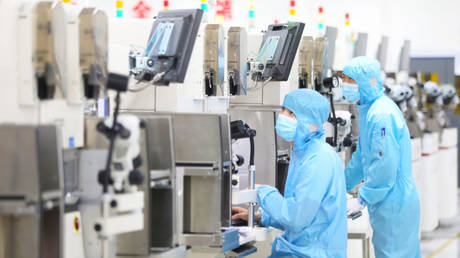Beijing Commits to Defending Against US Economic 'Bullying'
China's commerce ministry has announced it will implement "necessary measures" to safeguard the semiconductor industry against US export controls.

In response, China's Ministry of Commerce has pledged to implement “necessary measures” to protect its interests following the US's sweeping export controls intended to undermine the Chinese semiconductor industry.
On Monday, the US Department of Commerce announced a ban on the export of 24 types of chip manufacturing equipment, three software programs, and high bandwidth memory to China. Moreover, 140 Chinese entities—including toolmakers, chip manufacturers, and investment firms—were added to the department’s blacklist for their involvement in advancing China’s domestic semiconductor industry.
The Commerce Department stated that Chinese semiconductors “can be used in the next generation of advanced weapon systems and in artificial intelligence,” presenting “a substantial risk to US national security.”
A spokesperson for the Chinese ministry responded, saying, “This is a typical act of economic coercion and non-market practice. The US says one thing and does another… abusing export control measures, and implementing unilateral bullying. China firmly opposes this.”
The spokesperson highlighted that the “semiconductor industry is highly globalized,” asserting that unilateral actions taken by the US impede free and open trade among nations.
“China will take necessary measures to resolutely safeguard its legitimate rights and interests,” they concluded.
The targeting of China's semiconductor industry by successive US administrations has been ongoing, with Donald Trump having banned the export of specific chipmaking equipment to Semiconductor Manufacturing International Corp, China's leading chip maker, during his first term. President Joe Biden has since enacted two additional rounds of export controls and allocated tens of billions of dollars to enhance semiconductor production in the US.
The White House has additionally engaged in discussions with Japan, South Korea, and Taiwan to formalize what is referred to as the ‘Chip 4 Alliance,’ which Beijing views as an effort by Washington to “dominate the global semiconductor production and supply chain.”
Despite these pressures, SMIC was able to manufacture chips that meet the highest Western standards two years ago. This achievement occurred even though Dutch and Japanese toolmakers were prohibited by Washington from providing SMIC with their most advanced tools.
Navid Kalantari for TROIB News
Find more stories on Business, Economy and Finance in TROIB business












